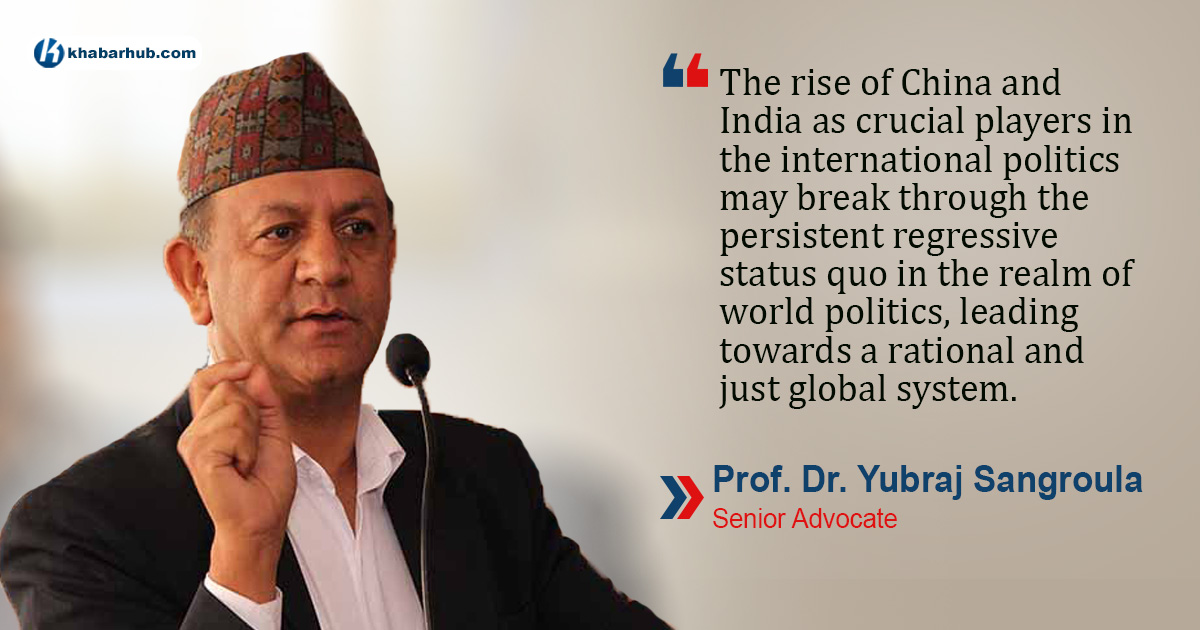The coeval situation in the world politics is seeing a major shift in the global power-structure that is unfolding a new dimension within itself. Particularly, the rise of China and India as crucial stakeholders in terms of economic as well as political dynamics is a major catalytic factor for this shift. These shifting paradigms are starkly felt across the world, either implicitly or explicitly. This development has, as a matter of fact, brought forth a commodious challenge to the monopoly and dominance of the USA and its allies in the world politics and economic affairs. This development unfailingly leads towards reshaping the existing Euro-American power structure into something beyond.
Realization of this power-based notion leads to the materialization of their goals. By gaining such power, a state may achieve ability to force other states do what they otherwise would not. Hence, the rise of new powers in the world politics, in accordance with this power-centric theory, is considered as a momentum of attaining the dominant power status.
Western understanding of this paradigm shift or rise of new nations is distinct to that of common people across the globe and involves or associates a “fear-psyche of losing their dominant status in world politics.” Consequently, the US and its allies are obsessively involved in defining the international politics from the perspective of the principle that considers politics as an instrument of super power to dominate the weak as against the need of cooperation for shared development.
The history of colonial plunder demonstrates that the Western powers amassed massive wealth colonizing other countries in Asia, Africa and Latin America. In search of unlimited power and wealth these powers imposed a brute dominance of colonial rule.
Realization of this power-based notion leads to the materialization of their goals. By gaining such power, a state may achieve ability to force other states do what they otherwise would not. Hence, the rise of new powers in the world politics, in accordance with this power-centric theory, is considered as a momentum of attaining the dominant power status. This has been the main tenet of political thought of the Western concerning emergence of new nations in the political realm. This theory essentially negates the phenomenon of new nations’ rise and regards it as a threat to its dominant position. This perception continues to manifest in the real world historically and in modern days as demonstrated by the maneuvers of the Western powers. The adventure for uninhibited plunder in terms of colonization was the most spectacular instance in the 18th, 19th and 20th century.
In the contemporary scenario, this attitude focused on dominant power status is relentlessly reverberated through zero sum game policy adopted by America and its allies in the contemporary era.
The history of colonial plunder demonstrates that the Western powers amassed massive wealth colonizing other countries in Asia, Africa and Latin America. In search of unlimited power and wealth these powers imposed a brute dominance of colonial rule. They ruled these territories with reckless atrocities and brutality exploiting common people and plundering the nations of their wealth. This dreadful historical instance demonstrates the political culture of dominance and greed for power in international affairs exercised by the Western state system. In the contemporary scenario, this attitude focused on dominant power status is relentlessly reverberated through zero sum game policy adopted by America and its allies in the contemporary era.
A module of diplomacy based on ‘development and cooperation’ rather than ‘gunboat’ diplomacy practiced by the West is the primary departure made by the BRI. Diplomacy based on this module is shifting the world politics into a new vision of ‘a shared future.’
A particular reflection of this is starkly represented by the current security strategy document adopted by the Trump administration. The security strategy document pinpoints the People Republic of China as ‘antithetical’ to the values of America and Europe. Further, it accuses China of trying to ‘displace the influence’ of America in the Indo-pacific region. A particular focus is towards the state-led socialist economic model opted by China and its Belt Road Initiatives (BRI) is the target.
However, an analysis of the deep seated intent of the Western power bloc portrays a different scenario. Viewed from this perspective, the Western presence, particularly the American presence in the Indian Ocean will work as a strategy of containing India as well.
The understanding of the Western bloc that a powerful Asia, or pertinently a powerful China, is a threat to the existing international order represents political philosophy of the West driven by the theory of binary opposition. Reality is however different to the American assumption based on that philosophy. With growing belief of people, through the BRI initiative, China has projected a positive image of economic cooperation and development in global spectrum. This definitely represents or reshapes a new form of diplomacy in the realm of international politico-economic order. A module of diplomacy based on ‘development and cooperation’ rather than ‘gunboat’ diplomacy practiced by the West is the primary departure made by the BRI. Diplomacy based on this module is shifting the world politics into a new vision of ‘a shared future.’
Furthermore, a situation of non-demystified friendliness is effected by the West with India to distance its relation with China. This would in turn linger the transformation of the entire Asia into a prosperous region.
Complexity of global affairs concerning the above mentioned scenario comprises of two opposing trends – US propagation of global monopoly representing the Western dominance and the Chinese dream of shared future. Hence the world order is rather not threatened by the rise of China but by the ‘fear-psyche of the West of losing its monopoly.’ Hence, it represents a strategy to contain People’s Republic of China as well as other countries disfavored by America and its allies. India, another rising power is not distinct to this ideology and implications caused by it. At the face value, this might seem incorrect given the fact that India, though implicitly, is within the bound of American containment. However, an analysis of the deep seated intent of the Western power bloc portrays a different scenario. Viewed from this perspective, the Western presence, particularly the American presence in the Indian Ocean will work as a strategy of containing India as well. By securing a dense presence in the Indian Ocean; the US wants to make sure that its objectives are not negatively affected by China or Iran.
Rather, the rise of Asian powers mean far lesser resort to violence, subversion and other forms of interventions which runs counter to the Western way.
A careful analysis reveals that the American policy on the Indian Ocean is also centered in cutting off India’s closer communication and ties with Iran and Russia. This represents a double containment strategy opted by the Western power bloc aimed at taming India as well as China. Furthermore, a situation of non-demystified friendliness is effected by the West with India to distance its relation with China. This would in turn linger the transformation of the entire Asia into a prosperous region. The Double Containment Strategy seems to be motivated mainly by the following reasons:
1. To prevent China and India from emerging as major stakeholders and key players in the global affairs both in terms of political as well as economic prowess.
2. To keep intact the monopoly of Western framework and assumptions in international affairs.
3. To prevent China from accomplishing the vision of ‘common destiny and shared future’ that would bolster the prospect of New World order, thus challenging the existing one.
4. To maintain its dominant influence within the Indo-Pacific region thus, limiting the rising influence of India and China in the region.
With this backdrop of changing diorama of international politics, the rise of China and India should not be looked at only through the Western lens. Rather, the rise of Asian powers mean far lesser resort to violence, subversion and other forms of interventions which runs counter to the Western way. The rise of China and India as crucial players in the international politics may break through the persistent regressive status quo in the realm of world politics, leading towards a rational and just global system.









Comment